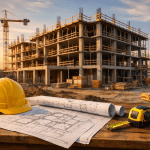
When it comes to civil works, Pre-Renovation planning stands as the cornerstone of success. From residential upgrades to large-scale commercial projects, a well-thought-out plan ensures that every step of the process runs smoothly. Without this stage, property owners risk unnecessary delays, budget overruns, and compromised results. At Charminar, we understand that successful renovations are built on strong foundations, and that foundation begins with effective Pre-Renovation planning.
The Role of Pre-Renovation in Civil Works
Civil works are inherently complex, involving multiple stakeholders, design considerations, and technical requirements. Pre-Renovation planning allows project managers, contractors, and clients to align their expectations before any physical work begins. This process covers crucial aspects such as site assessment, structural analysis, budgeting, legal permissions, and material selection. By laying out every detail in advance, unforeseen complications can be minimized, saving both time and resources.
For example, identifying structural weaknesses in an existing building during Pre-Renovation planning helps engineers propose the right solutions before construction begins. Similarly, understanding local building codes early on prevents legal issues that might halt the project midway.
Cost Management and Budget Control
One of the biggest benefits of Pre-Renovation planning is cost efficiency. Renovation projects often face budget overruns due to last-minute changes or overlooked issues. A comprehensive plan allows accurate estimation of materials, labor, and equipment. This not only provides a realistic financial outlook but also creates room for contingency funds in case of emergencies.
When Charminar undertakes a project, we ensure that Pre-Renovation planning incorporates transparent budgeting practices. Clients gain clarity on where their money is going, which builds trust and confidence. A carefully managed budget reduces financial stress and ensures that funds are allocated to priority areas, guaranteeing a higher return on investment.
Time Management and Project Scheduling
Delays are one of the most frustrating aspects of civil works. Without Pre-Renovation planning, unexpected challenges such as design conflicts, material shortages, or labor mismanagement can push deadlines significantly. A clear plan outlines the project timeline, from demolition to final finishing. This allows stakeholders to coordinate tasks efficiently and minimize idle periods.
Pre-Renovation scheduling also accounts for seasonal factors, availability of resources, and necessary approvals. By anticipating these variables, project managers can ensure timely completion while maintaining quality standards. Charminar’s approach emphasizes milestone tracking, ensuring that every stage of the project progresses as planned.
Enhancing Design and Functionality
Another critical reason Pre-Renovation planning matters is its impact on design and functionality. Renovations are not just about replacing old with new—they are about improving usability, aesthetics, and long-term value. During the planning stage, architects and designers collaborate closely with clients to understand their needs and vision.
This collaborative process ensures that layout designs, material choices, and finishing details align with the client’s lifestyle or business objectives. At Charminar, our Pre-Renovation process integrates 3D modeling and digital design tools, giving clients a realistic preview of the final outcome before construction begins. This avoids costly redesigns later and ensures satisfaction with the end product.
Risk Mitigation and Safety Compliance
Every renovation project carries risks—structural instability, hazardous materials, or unforeseen site conditions. Pre-Renovation planning plays a vital role in identifying and mitigating these risks early. Safety assessments are carried out to ensure that workers, residents, and surrounding properties remain protected throughout the project.
Furthermore, strict compliance with safety standards and building codes is integrated into Charminar’s Pre-Renovation process. This proactive approach minimizes liability, avoids legal complications, and enhances the credibility of the project.
Digital Fabrication and Customization
Every renovation project carries risks—structural instability, hazardous materials, or unforeseen site conditions. Pre-Renovation planning plays a vital role in identifying and mitigating these risks early. Safety assessments are carried out to ensure that workers, residents, and surrounding properties remain protected throughout the project.
Furthermore, strict compliance with safety standards and building codes is integrated into Charminar’s Pre-Renovation process. This proactive approach minimizes liability, avoids legal complications, and enhances the credibility of the project.
Environmental and Sustainability Considerations
In today’s world, sustainability is no longer optional—it is a necessity. Pre-Renovation planning allows contractors to incorporate eco-friendly materials, energy-efficient systems, and waste reduction strategies into civil works. From recycling construction debris to installing smart energy solutions, these practices not only protect the environment but also reduce long-term operational costs.
Charminar ensures that sustainability remains a core part of our Pre-Renovation strategy. We believe that modern renovations should contribute positively to the environment while providing long-lasting value to our clients.
Client Satisfaction and Long-Term Value
Ultimately, Pre-Renovation planning leads to higher client satisfaction and lasting value. A renovation project is a significant investment, and proper planning ensures that every penny contributes toward achieving the client’s vision. By addressing challenges in advance, avoiding unnecessary costs, and delivering projects on time, clients enjoy a seamless experience with results that exceed expectations.
At Charminar, we have witnessed firsthand how Pre-Renovation planning transforms projects. Clients who actively participate in this stage gain confidence, clarity, and peace of mind, knowing their project is in safe hands.
Conclusion
Pre-Renovation planning is more than just a preparatory step—it is the backbone of successful civil works. From managing costs and timelines to ensuring safety, sustainability, and quality, effective planning lays the groundwork for excellence. At Charminar, we prioritize this stage because we believe that a well-planned renovation is the key to delivering results that stand the test of time.
Whether you’re upgrading your home, revamping an office, or undertaking large-scale civil works, remember that success begins before the first hammer is lifted. And with Charminar’s expertise in Pre-Renovation planning, you can rest assured that your project will not only meet but exceed expectations.
Ready to Build with Confidence?
Get in touch with Charminar to learn how our project management expertise can streamline your next development.
📧 contact@bluediamondfm.com
📞 +971 56 705 4223
🌐 https://charminardubai.com/
Frequently Asked Questions (FAQ)
What is Pre-Renovation planning in civil works?
Pre-Renovation planning refers to the detailed preparation process before starting any renovation project. It involves assessing the site, creating budgets, scheduling timelines, obtaining permits, and designing layouts to ensure smooth execution.
Why is Pre-Renovation planning important?
It minimizes risks, prevents delays, controls costs, and ensures safety compliance. Proper planning also helps align client expectations with the final results, improving overall satisfaction.
How does Pre-Renovation planning save money?
By identifying potential problems early, allocating budgets accurately, and preventing last-minute changes, Pre-Renovation planning reduces unnecessary expenses and ensures cost efficiency.
What are the main steps in Pre-Renovation planning?
The process includes site assessment, structural analysis, budget estimation, design approval, material selection, scheduling, risk evaluation, and obtaining necessary legal permits.
Can Pre-Renovation planning improve project timelines?
Yes. By anticipating challenges and scheduling tasks efficiently, Pre-Renovation planning minimizes delays and ensures the project is completed within the agreed timeframe.







